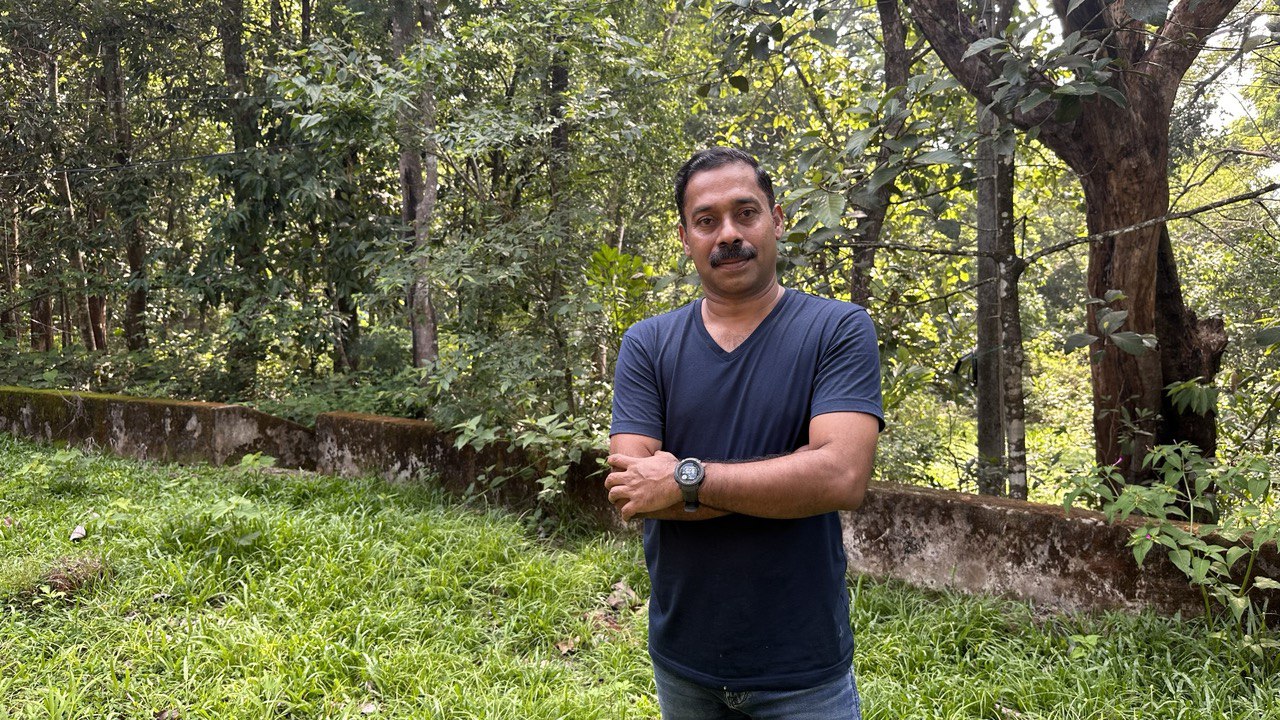Dr Arun Zachariah ended his two-decades-long association with the Kerala Forest Department and returned to his parental organization, the Animal Husbandry Department.

Dr Arun Zakhariah. Photo: Shaju John
Farmers in areas abutting the forests and others caught in man-wild animal conflict in Kerala are a worried lot.
Their worry stems from the fact that their go-to man whenever wild animals wreak havoc, Dr Arun Zachariah, is returning to his home department.
A household name across the state, Kerala’s Chief Veterinary Surgeon Dr Zachariah has successfully handled rogue wild animals with clinical precision, winning him fans across Kerala.
For those familiar with James Herriot, he is the hero, bigger than the British vet and author. Dr Zachariah also has his share of enemies, mostly self-proclaimed animal lovers, largely confined to social media.
Passionate and chivalrous, he addressed “beastly” problems, besides attending to his work at the Wayanad Wildlife Sanctuary’s veterinary clinic at Sulthan Bathery in the Wayanad district.
The celebrated veterinarian ended his two-decade-long association with the Forest Department this week and returned to his parent department, Animal Husbandry, even as man-animal conflict continues unabated in Kerala.
Though the surgeon and the Forest Department justified the development as a normal procedure on the expiry of deputation, farmers and others concerned over the increasing human-wildlife conflict felt his leaving the Wayanad Rapid Response Team (RRT) would adversely affect rescue and rehabilitation of crop-raiding and life-threatening wild animals.
Despite being located in Wayanad, Dr Zacharia’s services were available across the state, the latest being the capture and translocation of Idukki’s ration-shop raiding wild tusker Arikomban.
Insiders in the Forest Department, meanwhile, said Dr Zachariah’s return to the parent department was a fallout of the social media outrage over Arikomban’s capture.
The tusker, aged around 35, was tranquilised and captured after residents in and around Chinnakanal near Munnar raised a hue and cry over the elephant’s penchant for rice, which made him destroy ration shops and houses. The animal was also disputably tagged as a man-killer.
For Dr Zachariah and the RRT, calls for help came from across the state, specifically Wayanad, Idukki, Palakkad, and Pathanamthitta. The team selflessly worked to alleviate the threat from wild animals.
The team had also undertaken missions in Tamil Nadu and Karnataka to tranquillise and translocate wild elephants and tigers.
Some of the team’s notable missions include the translocation of Arikomban in Idukki, Palakkad Tusker (PT) 7 in Dhoni, Palakkad, and Pandalur Makhna (PM 2) in Sultan Bathery last year.
Dr Zachariah had several close encounters during his career. The image of the upended veterinarian hanging from the mouth of PM 2 remains fresh in the collective memory. He had also survived a tiger attack while attempting to tranquillise the animal.
Hailing from Mukkam in Kozhikode, Dr Zachariah began his career as an assistant veterinary officer in Muthanga, Wayanad, before joining the Forest Department two decades ago.
The RRT, led by Arun, has tranquillised around 60 wild elephants, 36 tigers, and numerous leopards and panthers over the past two decades. However, his departure could pose challenges for the RRT, especially during operations involving rogue elephants, given his vast experience and expertise in darting them.
The RRT has faced increasing pressure recently due to the rising incidents of human-animal conflicts in the state.
“I requested him to return to the department as we need his expertise. We plan to strengthen the RRT by bringing in more talented veterinarians,” Chief Wildlife Warden D Jayaprasad told South First.
“Arun is an expert in tranquilising, and we will need his guidance in future missions. He has groomed the present RRT, and all team members, including veterinarian Dr Ajesh Mohandas, are well experienced. In case of major operations, we will seek his help,” Wayanad Wildlife Warden KJ Martin Lowel added.
His admirers view him as a mix of Herriot and Jim Corbett — a mix of passion, professionalism, and courage — qualities that have placed him on a high pedestal.
Corbett had hunted 33 maneaters, besides tracking and shooting 19 tigers and four leopards. To his credit, Dr Zachariah has the national record of capturing and translocating 36 tigers, 63 elephants, and around 100 leopards across South India.
Wildlife experts close to Dr Zachariah said there was an adverse campaign against him after the capture and rehabilitation of Arikomban on social media at the behest of a set of animal lovers. He was hurt by their campaign that Arikomban was severely injured during the translocation initiative, and an overdose of darts affected his health significantly.
Dr Zachariah repeatedly denied the allegation, but social media continued to level the charge. Some users even questioned his commitment to wildlife.
Since Arikomban was recaptured after it crossed over to Tamil Nadu and created problems near Theni, animal lover groups have become active in Kerala.
They continue to say that Arikomban was facing severe health issues in his present forced abode inside the Kalakkad-Mundanthurai sanctuary, and they attribute the health issues to the injuries suffered during the relocation drives.
Arikomban, meanwhile, is unaware of the hullaballoo over him in Kerala and is foraging as usual, according to the Tamil Nadu Forest Department.

May 17, 2024

May 17, 2024

May 16, 2024

May 16, 2024

May 16, 2024

May 15, 2024